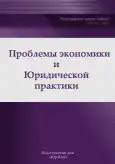Россия 2020-х: экономика и право перед вызовами индустрии 4.0
- Авторы: Курюкин А.Н.1
-
Учреждения:
- Центр комплексных социальных исследований Института социологии ФНИСЦ РАН
- Выпуск: Том 18, № 4 (2022)
- Страницы: 162-168
- Раздел: Статьи
- URL: https://journals.eco-vector.com/2541-8025/article/view/531977
- ID: 531977
Цитировать
Полный текст
Аннотация
Статья посвящена анализу магистрального направления перспективного развития мирового сообщества-Индустрии 4.0, как овеществленного выражения четвертой научно-технологической революции, что выступит определяющим для перспектив развития современной цивилизации на ближайшие 25-30 лет, а возможно, и более. Исследование проводится в ракурсе двух наиболее важных сфер современной общественной жизни-экономики и права. Исходя из этого, целью работы автор указывает формирование комплексного представления о современном этапе и перспективах интеграции Индустрии 4.0 в современную всемирную и отечественную общественную структуру, конкретно в призме её интерпретаций в экономике и правовой сфере. Экономическая интерпретация Индустрии 4.0 заключается сегодня в трех основных ипостасях-внедрение в функционирование экономических акторов технологий Искусственного Интеллекта, трансформация современного интернета в направлении таких инновационных форм как Интернет вещей (IoT) и Интернет людей (IoP) с углублением интеграции экономических акторов в эту виртуальную среду, формирование «умного предприятия» за счет создания киберфизических систем. Правовая сфера в условиях интеграции компонентов Индустрии 4.0 в общественную среду в целом, столкнется с рядом вызовов, среди которых, в первую очередь следует выделить необходимость адаптации политико-правовой системы под новые условия и формирования адекватных ответов на возникающие тренды. Также, уже сегодня, в порядке прогнозирования, может быть предложен список тех экономико-правовых проблем, с которыми столкнется общество в практике внедрения указанных выше элементов в общественно-экономическую практику.
Ключевые слова
Полный текст
Об авторах
Андрей Николаевич Курюкин
Центр комплексных социальных исследований Института социологии ФНИСЦ РАН
Email: kuriukin@inbox.ru
кандидат политических наук, старший научный сотрудник Москва, Российская Федерация
Список литературы
- Abdullah F.M. Privacy, security and legal challenges in big data.Int J Civ Eng Technol 2018; 9:1682-90.
- Allhoff F., Henschke A. The Internet of Things: Foundational ethical issues.Internet of Things 2018;1-2:55-66.
- Büchi G., Cugno M., Castagnoli R. Smart factory performance and Industry 4.0 // Technol Forecast Soc. Change 2020; 150 рр. 119-179.
- Chandra A.C., Pouchous K.I. Information and Communication Technology (ICT) Industry in the Fourth Industrial Revolution. Prospects and Challenges for Workers in Asia-Pacific. UNI-APRO ICTS Conf., 2017, p. 2-33.
- Crime and corruption in the 4th industrial revolution-Financier Worldwide n.d. URL: https://www.financierworldwide.com/crime-and-corruption-in-the-4th-industrial-revolution#.Yevm7v5BxPY (accessed: 16.01.2022)
- European Union. General Data Protection Regulation. Off J Eur Union 2016;59. Pagallo U. The Legal Challenges of Big Data: Putting Secondary Rules First in the Field of EU Data Protection. Eur Data Prot Law Rev 2017; 3:36-46.
- European Union.Internet of Things: an action plan for Europe.Commun From Comm To Eur Parliam Counc Eur Econ Soc Comm Comm Reg 2009:267.
- Fosch-Villaronga E., Millard C. Cloud robotics law and regulation: Challenges in the governance of complex and dynamic cyber-physical ecosystems. Rob Auton Syst 2019; 119:77-91.
- Gray A. Conflict of laws and the cloud // Comput Law Secur Rev 2013; 29:58-65.
- Hilgendorf E., Seidel U. Legal challenges facing digital value chains-structured solution paths for SMEs. Begleitforschung AUTONOMIK für Industrie 4.0; 2016.
- Hilgendorf E., Seidel U. Legal challenges facing digital value chains-structured solution paths for SMEs. Begleitforschung AUTONOMIK für Industrie 4.0; 2016.
- Hou J, Qu L, Shi W. A survey on internet of things security from data perspectives.Comput Networks 2019; 148: 295-306.
- Janeček V. Ownership of personal data in the Internet of Things.Comput Law Secur Rev 2018; 34:1039-52.
- Kagermann H., Wahlster W., Helbig J. Securing the future of German manufacturing industry: Recommendations for implementing the strategic initiative INDUSTRIE 4.0. Final Rep Ind 4.0 Work Gr., 2013. -84 р.
- Kemp R. Legal aspects of cloud security // Comput Law Secur Rev 2018; 34:928-32.
- Krishnan S., Chen L. Legal Concerns and Challenges in Cloud Computing // Computers and Society, 2019, 12, рр. 81-85.
- Lovellette E., Hexmoor H., Rodriguez K. Automated argumentation for collaboration among cyber-physical system actors at the edge of the Internet of Things.Internet of Things 2019; 5:84-96.
- Murphy M.H. Technological solutions to privacy questions: what is the role of law? Inf Commun Technol Law 2016; 25:4-31
- Nolan P., Adair M. Rising T.o. The Legal Challenges Of Big Data-Privacy-Ireland 2017. URL: http://www.mondaq.com/Article/593400 (accessed: 18.01.2022).
- Omidshafiei S., Agha-Mohammadi A-A., Chen Y.F., Üre N.K., How J.P., Vian J.L., et al. MAR-CPS: Measurable Augmented Reality for Prototyping Cyber-Physical Systems. AIAA Infotech @ Aerosp., Reston, Virginia: American Institute of Aeronautics and Astronautics; 2015, p. 1-13.
- Sahmim S., Gharsellaoui H. Privacy and Security in Internet-based Computing: Cloud Computing, Internet of Things, Cloud of Things: A review. Procedia Comput Sci 2017, 112, рр. 1516-1522.
- Schwab, K. The fourth industrial revolution. Geneva: World Economic Forum. 2016. -294p.
- Svantesson D.J.B. Between a rock and a hard place. An international law perspective of the difficult position of globally active Internet intermediaries // Comput. Law Secur. Rev. 2014, 30, рр.348-356.
- Trentesaux D., Rault R. Designing Ethical Cyber-Physical Industrial Systems. IFAC-PapersOnLine 2017; 50:14934-9.
- Vassakis K., Petrakis E., Kopanakis I. Big Data Analytics: Applications, Prospects and Challenges. In: Skourletopoulos G, Mastorakis G, Mavromoustakis CX, Dobre C, Pallis E, editors. vol. 10, Cham: Springer International Publishing; 2018, p. 3-20.
- Wachter S. Normative challenges of identification in the Internet of Things: Privacy, profiling, discrimination, and the GDPR.Comput Law Secur Rev 2018; 34:436-49.
- Weber R.H., Studer E. Cybersecurity in the Internet of Things: Legal aspects // Comput Law Secur Rev 2016, 32:715-28.
- Weber R.H.Internet of things-Need for a new legal environment? // Comput Law Secur Rev 2009; 25:522-7.
- Zeadally S., Jabeur N. Cyber-physical system design with sensor networking technologies. Institution of Engineering and Technology; 2016.
- Zhong R.Y., Xu X., Klotz E., Newman S.T.Intelligent Manufacturing in the Context of Industry 4.0: A Review. Engineering 2017; 3:616-30.
Дополнительные файлы











